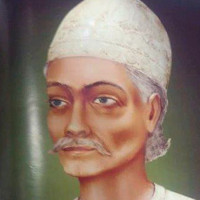Profile of Meer Khaleeq
Pen Name : 'Khaleeq'
Real Name : Meer Mustahsan
Born :Faizabad, Uttar pradesh
Died : Lucknow, Uttar pradesh
Relatives : Meer Anees (Son), Meer Munis Lakhnawi (Son)
Inheritance, lineage, and upbringing plays a significant role in any person’s rearing. Among the Urdu poets, Mir Anis's family is characterized by these rare qualities that for eight consecutive generations continued to contribute such a high level of Urdu poetry that it has became a paragon in its own class. Khaleeq’s family’s intellectual or artistic ability, such as in poetry or music that continued for more than seven or eight generations and is considered an extraordinary event of inherited traits in human society.
Mir Zahak's son was Mir Hassan. His son was Mir Khaliq. Even after Mir Khaliq, the tradition of poetry recitation and Marsiya-composition continued for four generations. His son Mir Anis and his son Mir Nafees, his son Urooj and then his son Mir Faiz are among the greatest Marsiya-composers. No acquired art lasts for many generations in a family. It is exclusive to this family that the conscientious art of poetry lasted for eight generations, that is, for a little over two and a half centuries. This is the family of the Iranian-born Mousavi Sadat, who came to Delhi from the city of Herat (Afghanistan) and settled in Delhi during the reign of King Jahan. At that time, the Mughal court of Delhi was the center of knowledge and literature. One of the members of this family was Mir Imami, who was a very capable and unique jurist and also had a taste for poetry. For four generations, the family lived a dignified life in Delhi. When the decline of the Mughal Empire began, the economic woes of the artists began to grow. The nobles and Sahib Kamal people left their residence in Delhi and turned to Awadh. Mir Ghulam Hussain Zahak, the great grandson of Miramami Mousavi, also came to Faizabad, the capital of Awadh, with his eldest son Mir Hassan. In Faizabad, the Awadh government had set up an office to compile proverbs and idioms. Mir Hassan was appointed its secretary. He was staying at Gulab Bari in Faizabad, where the Anis-o-Chakbast Library is now located.
Mir Mustahasan Khaliq was the middle son of Mir Ghulam Hassan alias Mir Hassan. Traditionally, they were educated at home. Sheikh Imam Bakhsh Naskh also used to instruct his students to go to Mir Khaleeq if they want to learn the language. It has been mentioned that from the age of sixteen, Khaleeq became inclined towards poetry. He educated by the teachers of Faizabad and Lucknow. Khaliq initially sought amends in his poetry from his father Mir Hassan for a few days. Mir Hassan was busy writing "Masnavi Sahar Al Bayan" in those days, so he gave Khaliq as a disciple of Mushafi. It is also stated that first Mir Hassan took Khaliq to Mir Taqi Mir but he said that he could not pay attention to the training of his own children so where could he get the respite to reform and train someone else’s. Only after hearing this answer from Mir Sahib did he hand it over to Mushafi. Undoubtedly, as far as ghazals are concerned, the Mushafi gave proper guidance to Khaleeq and introduced him to the nuances of this art. It is also said that Mushafi compiled the book "Tazkira Hindi" containing the tazkiras of the poets on the recommendations of Mir Khaliq. Mir Khaliq's first job was with a Neshapuri family in Faizabad for Rs. 15 a month. After that he became associated with the government of Mirza Muhammad Taqi Khan Tarqi, brother-in-law of Nawab Asif Al-Dawla. Sometimes he used to come to Lucknow from Faizabad and stay with Mirza Fakhr-ud-Din alias Mirza Jafar who lived in Mohalla Pir Bukhara for a few days and used to attend poetry recitals and literary gatherings in Lucknow.
The ’Adabi Daftar-e-Muhaavarat-o-Zarb-ul-masal’, whose author was Mir Hassan, was later handed over to Mir Khaliq. When Saadat Yar Khan Rangin Dehlavi came to Faizabad, he met Mir Khaliq and Rangin expressed his views on some suspicious poems of Mir Hassan's Masnavi Sahar Al Bayan and sought correction from them. Mir Khaliq's permanent residence was in Faizabad but as mentioned above he also used to come to Lucknow for some time. It is not known with certainty when he left his residence in Faizabad and settled in Lucknow.
In this family, the series of ghazal recitation ended with Anis. In fact, where the ghazals of Khaliq are hardly available, there is no source for the ghazals of Anis. In the beginning, nineteen ghazals were corrected by Khaliq. The father felt that the field of ghazal would be too narrow for Anis, so one day after correcting the ghazal, he said to Anis, "Son, now bid farewell to the ghazal." From that day onwards, Anis followed his father's advice and composed only Salam and Marsiya. How right was Khaliq's opinion, that he gave Urdu a poet like Anis whose words weighed the scales of poetry.
Mir Khaliq’s poetry is an exemplar of the period between the schools of Delhi and Lucknow in which he worked with great sophistication in proverbs and everyday usage and this is what Mir Anis inherited.
Mir Khaliq passed away in 1844 at the age of 77, and left behind 3 sons and 4 daughters, of whom Mir Babar Ali Anis was the eldest.

